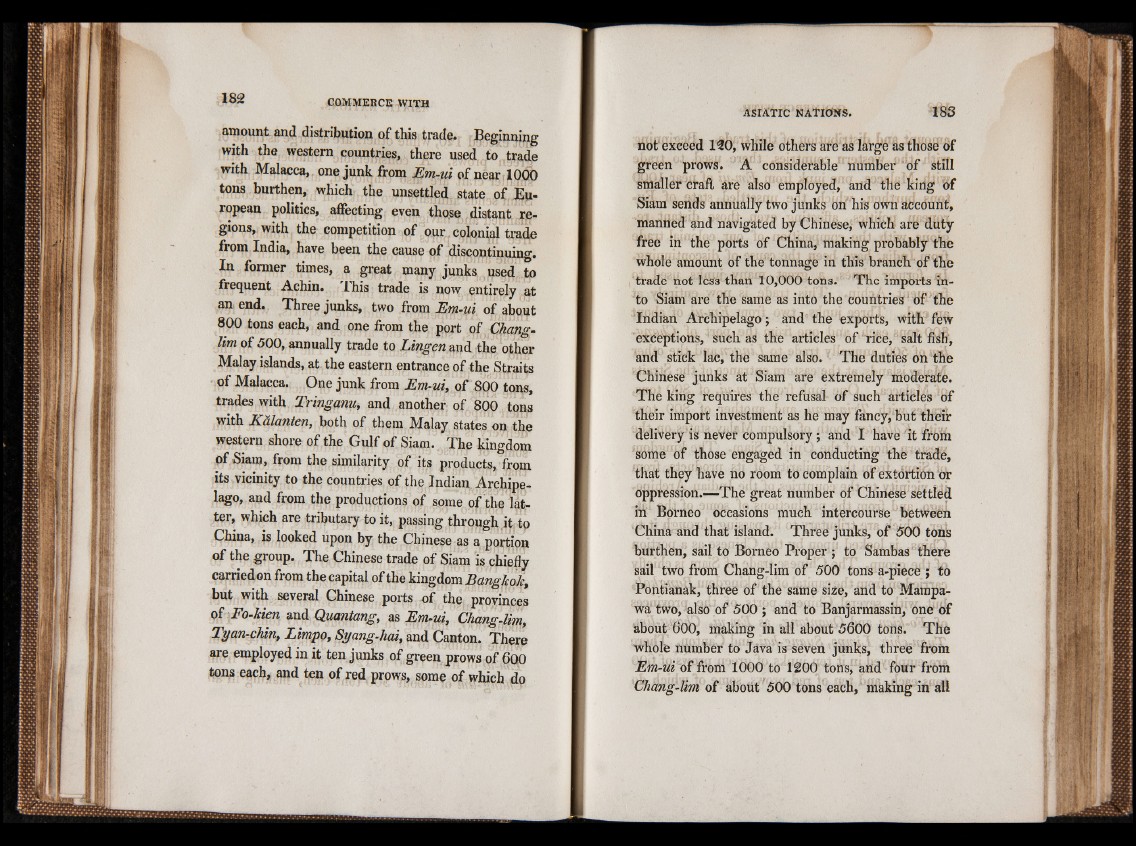
amount and distribution of this trade. Beginning
with the western countries, there used to trade
with Malacca, one junk from Em-ui of near 1000
tons burthen, which the unsettled state of European
politics, affecting even those distant, regions,
with the competition of our , colonial trade
from India, have been the cause of discontinuing.
In former times, a great many junks used to
frequent Achin. This trade is now entirely at
an end. Three junks, two from Em-ui of about
800 tons each, and one from the port of Chang-
lim of 500, annually trade to Lingen and the other
Malay islands, at the eastern entrance of the Straits
of Malacca. One junk from Em-ui, of 800 tons,
trades with Tringanu, and another of 800 tons
with Kalanten, both of them Malay states on the
western shore of the Gulf of Siam. The kingdom
pf Siam, from the similarity of its products, from
its vicinity to the countries of the Indian, Archipelago,
and from the productions of some of the lat-
ter, which are tributary to it, passing through it tp
China, is looked upon by the Chinese as a portion
of the group. The Chinese trade of Siam is chiefly
carriedon from the capital of the kingdom Bangkok,
but with several Chinese ports of the provinces
of Fo-kien and Quantang, as Em-ui, Chang-lim,
Tyan-chin, Limpo, Syang-hai, and Canton. There
are employed in it ten junks of green prows of 600
tons each, and ten of red prows, some of which do
not“ exceed 120, while others are as large as those Of
green prows. A considerable number of still
smaller craft are also employed, and the king of
Siam sends annually two junks on his own account,
manned and navigated by Chinese, which are duty
free in the ports of China, making probably the
whole amount of the tonnage in this branch of the
trade not less than 10,000 tons. The imports into
Siam are the same as into the countries ' of the
Indian Archipelago ; and the exports, with few
exceptions, I such as the articles of rice, salt fish,
and stick lac, the same also. The duties on thè
Chinese junks at Siam are extremely moderate.
The king requires the refusal of such articles of
their import investment as he may fancy, but their
delivery is never compulsory ; and I have it from
some of those engaged in conducting the trade,
that they have no room to complain of extortion or
oppression.—The great number of Chinese settled
in Borneo occasions much intercourse between
China and that island. Three junks, of 500 tons
burthen, sail to Borneo Proper j to Sambas there
sail two from Chang-lim of 500 tons a-piecc ; to
Pontianak, three of the same size, and to Mampa-
wa two, also of 500 j and to Banjarmassin, one of
about 600, making in all about 5600 tons. The
whole number to Java is seven junks, three from
Em-ui of from 1000 to 1200 ton s^ and four from
Chang-lim of abolit 500 tons each, making in all